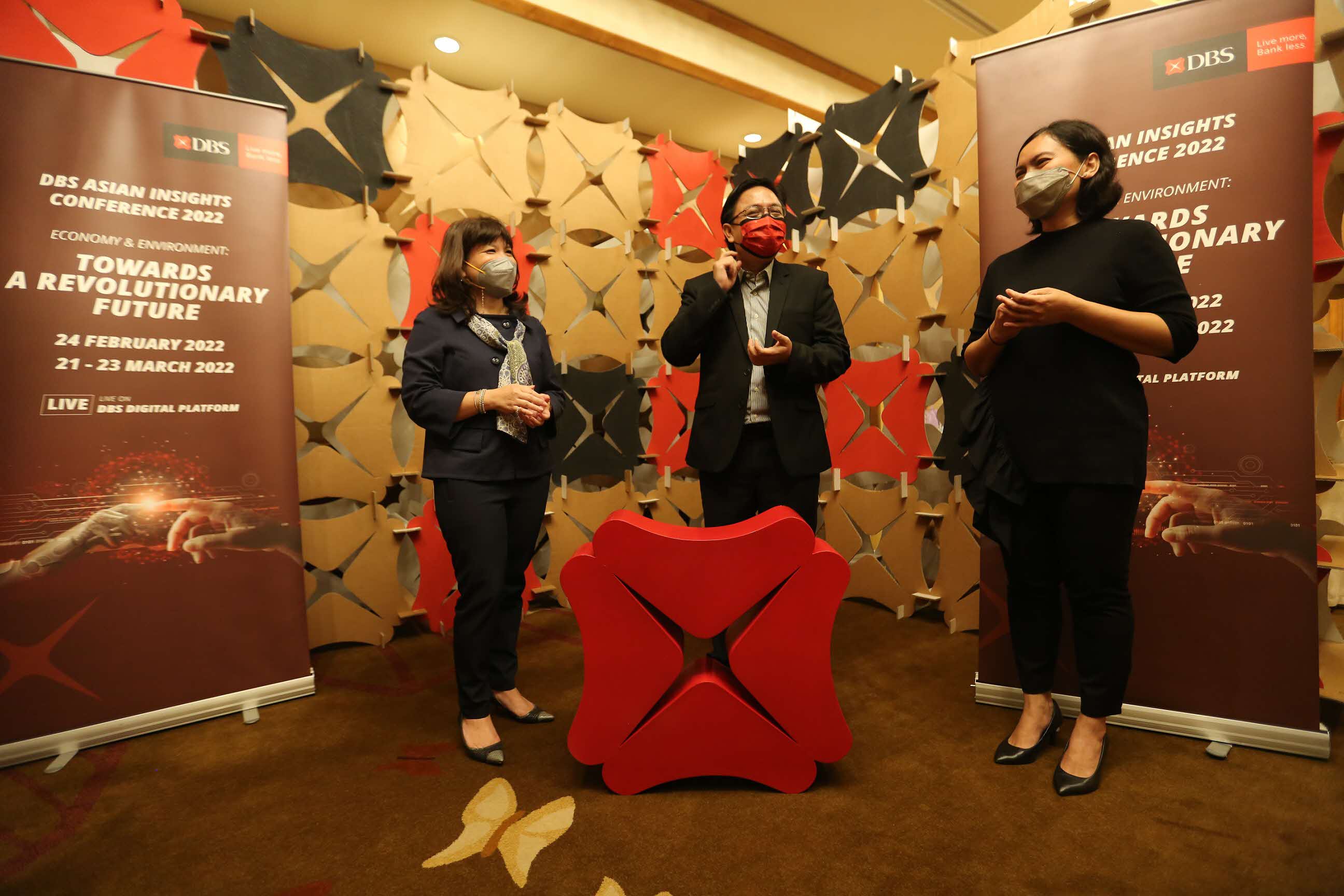DBS Asian Insights Conference 2022: Government of Indonesia’s accelerated economic recovery strategy to reach endemic phase of COVID-19 | Bahasa
Partnership and SME development are the Government of Indonesia’s main focus
Political stability one of the key factors in economic recovery acceleration

The COVID-19 pandemic is entering the third year, but Indonesia’s national economy grew by 3.69%, a significant improvement compared to a 2.07% contraction in 2020. Indonesia also charted a higher growth rate compared to several other ASEAN countries such as Malaysia (3.1%), Vietnam (2.58%), and Thailand (1.6%). High global commodity prices had a positive impact on Indonesia's national exports and economic growth. In 2021, the value of Indonesia's exports reached US$231.54 billion, a surge by 41.88% from 2020.
Vice Minister of Finance Prof. Dr. Suahasil Nazara pointed out that the declining number of COVID-19 cases and the relaxation of social restrictions were the main contributors to the strong growth of Indonesia's business sector. This was made possible by growing consumption and retail activities alongside an increase in public mobility. This was indicated by an increase in Indonesia's consumer confidence index, which was above the optimistic target, and for six months in a row Indonesia's Manufacturing Purchasing Managers’ Index (PMI) was above 50, which was an expansion from the previous month.
"With a higher growth rate in 2021, Indonesia has increased its growth target for 2022 to 5.2% year on year (yoy). Inflation rate is expected to remain under control and stable this year. Nonetheless, the government must continue to monitor global price gains to maintain a stable economic growth. In addition, the government should make continuous consolidation efforts through improvements in its ability to increase tax revenue and better consumption strategy in the State Budget (APBN) to increase efficiency and reach the target," said Prof. Dr. Suahasil Nazara.
Deputy Chairperson of KADIN Shinta Kamdani said that the handling of COVID-19 remains a top priority. Shinta Kamdani is optimistic that Indonesia’s economy will accelerate, supported by a successful transition from pandemic to endemic status with citizens expected to start adapting to life with COVID-19. The mobility restrictions led to a decline in Indonesia’s economic growth at the beginning of the pandemic, but the Manufacturing Purchasing Managers’ Index has started to recover. Since 2020, the manufacturing industry has charted growth and is starting to expand. Every industry will recover at a different pace, but there will be gradual change before the economy starts to recover.
"Although Indonesia's market is recovering, many micro, small and medium enterprises (MSMEs) have gone out of business due to the COVID-19 pandemic. Considering that 95% of entrepreneurs in Indonesia are MSMEs, their movements are the key to a positive indicator of Indonesia’s economic condition. Currently, the Indonesian government and KADIN are focusing on MSME development to help them become more competitive on the global market through an integrated approach with emphasis on partnerships with MSMEs. This can be achieved through the Job Creation Law, which is believed to be able to spur the growth of both the upstream and downstream sectors, encouraging foreign investors to invest in Indonesia thus opening greater opportunities for entrepreneurs to accelerate their business growth and help stimulate national economic growth," Shinta Kamdani concluded.
DBS Chief Economist Taimur Baig said, “MSMEs around the world are experiencing a difficult time and 2022 will pose new challenges for them. To address the challenges, the Government of Indonesia can take several steps, such as designing stable tax regulations and policies and improving government functions. The government can also make some policy changes to facilitate tax payment, simplify the procedure to obtain business licenses, and issue business recommendation letters for people who want to start a business. In short, the government should strive harder to simplify the administrative system for MSMEs to enable them to grow fast, not only regionally but also globally.”
Taimur Baig added that the Indonesian government should pay attention to a number of issues. In the next several years, Indonesia should start designing economic strategies for the regional and global markets. Taking advantage of the ease of access and opening up opportunities for regional cooperation can help business players become more competitive. This will enable businesses to grow rapidly and offer more mature solutions in responding to regional market demands, which in turn can develop a more comprehensive regional economy.
This year, the Fed is expected to increase its rates, which will lead to higher loan interest rates, including mortgage rates, housing loans (KPR), credit card installments, or auto loan payments. In addition, the cost of business loans will also increase for both large and small businesses. This will lead to a potential volatility on the global financial markets. Nevertheless, political stability is one of Indonesia’s key assets that can serve as protection against changes in the Fed's rates as well as the impacts of global turmoil on Indonesia’s economy.
On the same occasion, Executive Director of Indonesian Political Indicator Burhanuddin Muhtadi explained that each occurence is unique by nature. Unlike the 1997 monetary crisis that left a major impact on the upper-middle class, the COVID-19 pandemic has affected all layers of society, particularly the lower-middle class as they are the most affected by the pandemic. The social restrictions make it hard for people to carry out economic activities. Therefore, government policies in controlling the COVID-19 pandemic greatly affect public trust in the government.
"According to a survey by Indonesian Political Indicator, public trust in (approval rating of) President Joko Widodo has continued to increase to reach 77% and ranked second out of 13 other democracies since December 2021. To increase the approval rating, the government needs to immediately resolve economic issues that directly affect people's lives, such as increasing food prices and providing job opportunities. In addition, the government can use the 2022 G20 Summit as a forum to show Indonesia's potential in the global arena. I hope that by hosting the 2022 G20 Summit, Indonesia can influence public sentiments towards the government and create a positive impact on Indonesia’s economic development," said Burhanuddin Muhtadi.
The Asian Insights Conference is an annual conference held by Bank DBS Indonesia that brings together leaders with global mindsets to discuss the opportunities and challenges of change in Indonesia, especially in the recovery period and the new normal phase in the midst of the COVID-19 pandemic. Business people, investors, and the wider community will learn about the government’s strategy to deal with the pandemic and about Indonesia’s and global economic conditions. The conference is expected to turn worries and doubts into actions and strategic decisions regarding the future direction of businesses.
The third and fourth sessions of Asian Insights will take place from March 22 to 23, respectively, which can be watched at the following link. Information about the 2022 Asian Insights Conference can be seen on Instagram: @dbsbankid and here.
[END]
About DBS
DBS is a leading financial services group in Asia with a presence in 18 markets. Headquartered and listed in Singapore, DBS is in the three key Asian axes of growth: Greater China, Southeast Asia and South Asia. The bank's "AA-" and "Aa1" credit ratings are among the highest in the world.
Recognised for its global leadership, DBS has been named “World’s Best Bank” by Euromoney, “Global Bank of the Year” by The Banker and “Best Bank in the World” by Global Finance. The bank is at the forefront of leveraging digital technology to shape the future of banking, having been named “World’s Best Digital Bank” by Euromoney and the world’s “Most Innovative in Digital Banking” by The Banker. In addition, DBS has been accorded the “Safest Bank in Asia” award by Global Finance for 13 consecutive years from 2009 to 2021.
DBS provides a full range of services in consumer, SME and corporate banking. As a bank born and bred in Asia, DBS understands the intricacies of doing business in the region’s most dynamic markets. DBS is committed to building lasting relationships with customers, and positively impacting communities through supporting social enterprises, as it banks the Asian way. It has also established a SGD 50 million foundation to strengthen its corporate social responsibility efforts in Singapore and across Asia.
With its extensive network of operations in Asia and emphasis on engaging and empowering its staff, DBS presents exciting career opportunities. For more information, please visit www.dbs.com.

